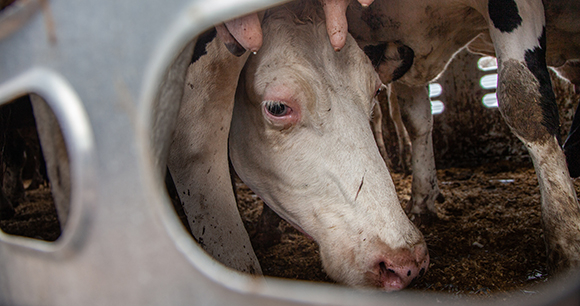
Washington, DC—Today, US Rep. Dina Titus (D-NV) reintroduced the Humane Transport of Farmed Animals Act to improve conditions for livestock transported across the United States. The bill would require federal officials to develop a process to enforce the Twenty-Eight Hour Law, which prohibits the transport of certain animals for longer than 28 hours without offloading them for food, water, and rest. Importantly, this legislation also would prohibit interstate transport of livestock considered unfit for travel.
The bill’s reintroduction with bipartisan support comes on the same day that the Animal Welfare Institute (AWI) released an updated report, Farmed Animals in Transport: The Twenty-Eight Hour Law, based on an analysis of 17 years of federal records obtained under the Freedom of Information Act. The report, which concludes that the law is rarely enforced, documents a pattern of widespread noncompliance, delayed investigations, and minimal consequences.
“The worst abuses in farmed animal transport occur when animals are hauled extremely long distances or when they are ill, disabled, or otherwise in such poor condition that they can’t withstand the journey,” said Adrienne Craig, senior policy associate and staff attorney for the AWI’s Farmed Animal Program. “The millions of animals carried on our roads every year should be entitled to protection under our nation’s oldest animal welfare law—the Twenty-Eight Hour Law—but that’s not possible without a clear mechanism for enforcement and cooperation among agencies. We applaud Congresswoman Titus for introducing the Humane Transport of Farmed Animals Act to prohibit interstate transport of livestock considered unfit for travel (in accordance with internationally recognized fitness standards), and to develop a process for enforcement of violations.”
Specifically, AWI’s report found that:
- From 2006 to 2023, the US Department of Agriculture made only 20 inquiries into possible violations of the Twenty-Eight Hour Law, four of which resulted in official warnings. Only one case was referred to the Department of Justice; federal records indicate no further action was taken.
- FOIA records suggest that the USDA has been unable to substantiate violations because livestock haulers are not required to keep detailed records of duration, mileage, or stops, and standard industry forms that producers send with the animals do not provide accurate or complete information regarding the journeys.
- At least three federal departments are associated with the Twenty-Eight Hour Law—the USDA, the DOJ, and the Department of Transportation—yet records indicate confusion over which of these is responsible for monitoring compliance and penalizing violators.
- In multiple cases involving Canadian transport companies, USDA officials concluded they lacked any authority to act, despite no exemption under the Twenty-Eight Hour Law for foreign entities operating within the United States.
Millions of animals are transported interstate each year, yet virtually none of those shipments are monitored for compliance with the Twenty-Eight Hour Law. In a review of over 3,500 certificates of veterinary inspection for cattle leaving Florida in 2023, for instance, AWI identified 173 shipments involving over 30,000 total animals that likely violated the Twenty-Eight Hour Law. These results are alarming given that they represent a single year in Florida, which is not a major animal agriculture state.
Transport for slaughter, breeding, and feeding is extremely stressful for livestock. In addition to the vibrations, noise, fumes, and unfamiliar environment, transported animals often experience prolonged food and water deprivation, intense crowding, exposure to extreme heat and cold, and physical strain and injuries from rough handling and having to balance in a moving truck. These stressors also lower an animal’s resistance to infection; consequently, transport stress also contributes to the spread of disease (including zoonotic diseases that can jump to humans) and to meat contamination.
Under current US live animal export regulations, animals intended for export to countries other than Canada or Mexico must be evaluated to ensure they are sound, healthy, and fit to travel. These regulations were adopted in 2016, after AWI petitioned the USDA to stop allowing exports of animals who were too young, weak, or sick to travel. Unfortunately, no such requirements exist for farmed animals transported long distances across the United States.
The Humane Transport of Farmed Animals Act would amend the federal Animal Health Protection Act to mirror fitness criteria governing US live animal exports, and those of the World Organisation for Animal Health—the leading international authority on the health and welfare of animals.
Inadequate enforcement of the Twenty-Eight Hour Law, coupled with the continued interstate transport of animals unfit to travel, is contributing to needless animal suffering and endangering the health and safety of millions of animals—and us. Passage of the Humane Transport of Farmed Animals Act would help ensure that animals who are fit to travel are not deprived of basic necessities along the way and that ill or infirm animals are not subjected to grueling journeys that worsen their condition and exacerbate their risk of contracting dangerous diseases.
“For far too long, federal regulations requiring humane treatment of transported farm animals have not been enforced,” Titus said. “The Humane Transport of Farmed Animals Act would stop this lax regulation that has resulted in many animals being injured or succumbing to disease during transport.”
Marjorie Fishman, Animal Welfare Institute
[email protected], (202) 446-2128
The Animal Welfare Institute (awionline.org) is a nonprofit charitable organization founded in 1951 and dedicated to alleviating animal suffering caused by people. We seek to improve the welfare of animals everywhere: in agriculture, in commerce, in our homes and communities, in research, and in the wild. Follow us on Facebook, Instagram, Threads, Bluesky, and LinkedIn for updates and other important animal protection news.